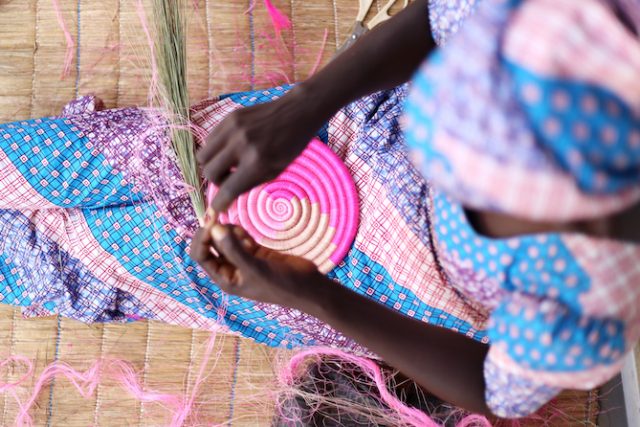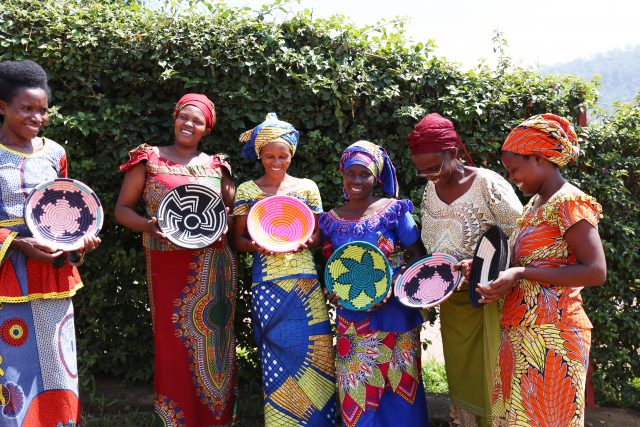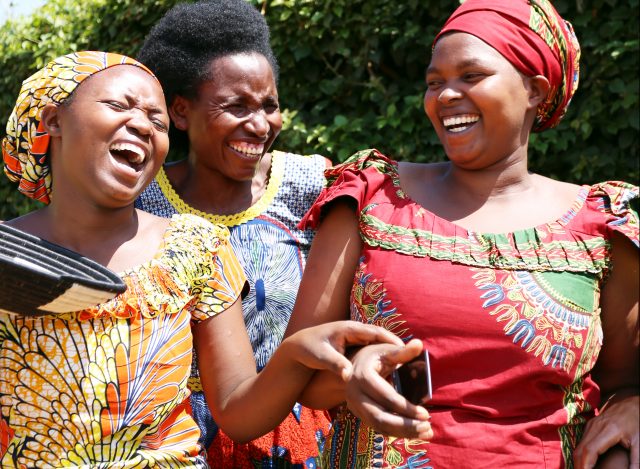This blog comes to us from our partner Indego Africa, a nonprofit that empowers artisan women in Rwanda and Ghana.
Did you know that the artisan sector is the second largest employer in the developing world, behind agriculture? That’s right: millions of people in developing countries around the globe—most of them women—participate in the artisan economy, practicing traditional crafts as a means to earn income and sustain their livelihoods.

Photo credit: Indego Africa
These numbers are exciting, and there are more where they came from. The global artisan economy is a $34 billion per year industry. Promisingly, countries in the developing world have a competitive advantage in this sector because of their rich cultural traditions, diverse artisanal skills, and unique raw materials. In fact, developing countries today account for 65 percent of handicraft exports around the world.
While these facts paint a powerful picture, the artisan sector still has a long way to go to reach its full potential as a sustainable source of income generation, employment, and economic growth for impoverished communities around the globe. This World Fair Trade Day, we—Indego Africa—wanted to take the opportunity to shine a spotlight on the artisan sector and share more about why we support artisans and fair trade.
First, a little bit about us: we are a nonprofit organization and design company dedicated to empowering artisan women in Africa. Founded in 2007, we partner with 1,000 artisans in Rwanda and, most recently, Ghana to sell home décor, apparel, and accessories that are designed in New York City and handmade in Africa—combining traditional techniques, local materials and amazing artisanal skill. We pool 100 percent of the proceeds from sales, with grants and donations, to run business and entrepreneurship training programs for the women who handcraft our products.

Photo credit: Indego Africa
Our model combines access to market opportunities and access to education because these are some of the most pressing challenges that artisans in Africa, and across the developing world, face today. We help integrate artisans in Rwanda and Ghana into the global economy by bringing their products to the international market and providing them with fair, consistent income for their work.
Since day one, we have been committed to paying our partners fairly and in accordance with the Fair Trade Federation’s principles of respect, transparency and accountability (learn more about these values here). We believe that paying artisans fairly is both the right thing to do and the wise thing to do. It’s right because it honors the time, skill, artistry, and expertise that goes into the making of each product and treats people with the respect and dignity they deserve. It’s also wise because empowering artisans—and especially women—is a powerful way to drive economic growth and sustainable development in communities around the globe.
Since working with us, our Rwandan partners’ income has increased significantly (700 percent, to be exact) from approximately 25 cents a day in 2008 to, on average, $2.00 a day or more in 2015! These women use the income they earn to invest in the health, education, and well-being of their families. For example, today, 72 percent of our partners never run out of food (versus only 5 percent in 2008); 89 percent send all or most of their children to school (versus 50 percent in 2008); and 90 percent have medical insurance for their entire families.
We (along with many others) like to call this phenomenon the multiplier effect—that is, the reverberating positive impact that investing in women has on their families and also on their communities. However, we don’t stop at providing women with income. We like to ensure that our impact is self-sustaining by providing women with the education they need to become confident, independent businesswomen. Our training programs equip women with knowledge and skills that empower them to build their own sustainable businesses, create employment opportunities for others, and become agents of change in their communities.

Photo credit: Indego Africa
Over the past nine years, we have seen firsthand the power of the artisan economy to improve livelihoods and drive sustainable development in socioeconomically marginalized communities in Rwanda (and soon, we hope, in Ghana). Around the world, there is still much to be done to truly harness the power of this sector. According to the Alliance for Artisan Enterprise, the artisan sector remains “fragmented and under-resourced,” and many artisans continue to work “in isolated environments, without business skills, market access, and the financial tools needed to boost production and sales.”
With these challenges in mind, organizations and individuals that aim to make a difference by advancing fair trade and investing in the power of education—with an eye towards long-term, sustainable impact—are off to a good start.
ONE and Indego Africa teamed up last year to create an exclusive basket, woven with colorful sweetgrass and delivered with a note from the artisan by whom it was hand-crafted. You can find it now in the ONE store.
